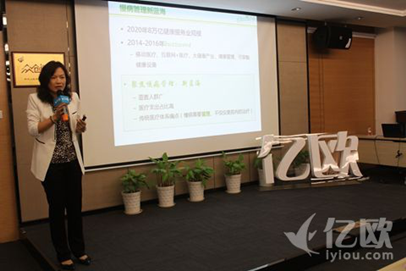

On September 2, 2016, IYIOU South China Medical Salon was held in Shenzhen successfully. President of Belter Health Fang Yanlin, CEO of 7LK Jiang Haidong, Founder of Best Unimed Medical Group Lin Feng, CEO of Jiuyi 160 Luo Ningzheng, Vice President of Jiankangle Wang Kuizhong, Chief Scientist of New Element Zhang Qian, Vice President of New Peak Zhang Keshuai, Director and General Manager of Share Capital Zhao Hong and Co-founder of IYIOU company Zhang Jiawei were invited to attend the salon. Themed by "reform and transformation", the salon discussed in deep Internet medical care, medical group, precise medical care, chronic disease management and e-commerce of medicine.

Chief Scientist of New Element Zhang Qian stated that
1) Chronic diseases which are the weakness of current medical system shall be managed;
2) Chronic disease management demands for not only doctors but also basic service personnel;
3) Chronic disease management should be combined with insurance to resolve the problem of payment.
New Element has established for ten years. I would like to share some lessons and experience in the industry. New Element has its own definition of network hospital because we may pay more attention to such a platform for chronic disease management services.
Why chronic diseases?
It should be say that everyone cares about great health industry. 2014 was a year that many of our staffs were eager to move. From 2014 to 2016, however, when "mobile medical care", "great health", "Internet" or "medical care + Internet", etc. were so popular, we slowed down because no particularly mature business mode was found. After our constant exploration, we decided to focus on chronic disease management.
As to the large market I mentioned above, more importantly, it is also a market that cannot be resolved only by current medical system. Using doctors and large hospitals to manage the chronic diseases may end up in vain, while it may also a waste of resources. However, chronic disease management itself is focused on "management" which is also the part hard to be implemented.
Chronic diseases need to be managed, which is the thorny issue of current medical system. How to manage? All of us here today are engaged in great health, we know that the foundation is to know the conditions, risk factors and constitution. Where are the health datas of patients came from? Out-patient diagnosis during doctor-seeing, years of medical reports, blood pressure and blood glucose monitored daily and all surveys given by professionals.
After the assessment, it is to change the health condition of patients. Except for an operation, not every kind of medicine is suitable for everyone. a management scheme shall be designed for each patient including selection of medicine, medication pattern, diet, exercise and even rehabilitation. The management scheme shall be implemented for long time to form a cycle, which is the process of the chronic disease management. The procedure seems hard to be implemented. Who shall do it?
Chronic diseases sound tough, why? Because it mean that you may feel pain just temporarily or intermittently, but the problems may last long. It may not immediately deadly, but with a long treatment cycle without obvious effect. Patients may forget it when they are busy. In such condition, how chronic disease managers to build compliance and continuousness of the management among patients? It is very important.
Compliance is based on professions, the management shall be designed by specialists. Who shall implement it? Patient himself might not be self-disciplined enough for it. So you need to change something related to human nature, a team and service personnel. We think it is very simple. Doctors in large hospitals are absolutely required.
Secondly, we shall have a new industry pattern and a new health management team, who assist doctors and implement patients health program. They may not be doctors or professors of large hospitals, but they can implement the schemes with patients. Being together is very important.
Chronic disease management is personalized.
One of my uncles was hospitalized in neurology department due to stroke, but then suffered from liver disease due to wrong medication. He joked ironically that he went in as a psycho, go out as a bad liver. This case proved that chronic disease management shall be personalized based on tons of data of the patients.
The most ideal mode now is to build a large health platform, if possible, and collect medical information, public health information, various wearable information and out-hospital information.
Who will pay?
The mode is quite different from the free mode based on Internet. Such management has professional guidance and implementation which shall be paid. It is hard work, which shall be paid correspondingly. Hence, we think chronic disease management services shall be specific and be priced.
Then it leads us back to commercial insurance which is also a strong support to great health industry. However, commercial insurers also a thorny issue: how to design the insurance for the patients of chronic diseases. Without a sound risk control, the compensation will be high, you certainly dare not to do it.
I have worked with several large insurers in China during the last two years. It is interesting to witness product actuary working. They calculated, if a disease is at risk of compensation, there might be no product for it. Therefore, if we are unable to reduce the risk through disease management, it is impossible to develop involve insurers. Therefore, the management we proposed covers both previous and post stage, i.e. both online mode and offline implementation service are required. Ultimately, combine such management mode with insurers to resolve the payment problem.
New Element has such an idea and made efforts for it for year. We try to create network hospitals for some hospitals in Guangdong or several other regions in China to engage doctors through our platform.
New Element had the honor to cooperate with one or two physician groups in Guangzhou who were involved through our platform. They are responsible for proposing and confirming the management schemes before and after diagnosis, and then the part of online and offline service: as for offline work, we set up health stations in communities and enterprises, assigning our health managers to those stations to provide the services. In order to fully use Internet, we designed APPs and wearable devices.
This is a new service pattern aiming at providing health management services. After the services, insurance product for each service shall also be designed.
Such frame is our layout in the industry. New Element creates a platform supporting business. We use the platform of network hospital to promote the hospitals and doctors. We invite doctors to cooperate with us and set up a team including "general practitioner + health managers". Meanwhile, through extending the idea on doctors, set up many offline service stores to implement the services.
Supported by associations and hospitals, we have conducted large scale public health screening in Guangzhou and Shenzhen. We also hope that peers in the region can be engaged in the effort to help patients know the diseases early, design prevention and management schemes and provide the public relevant services in a better way.
Let's go back to the above-mentioned precise and personalized management of chronic diseases.
Every link requires personnel to implement, but doctor involvement is not necessary for each link. Doctors are mainly responsible for disease assessment. Specialized and general doctors formulate the schemes together, and then latter guides health managers to implement for a long-term chronic disease management service pattern.
We really hope to popularize a concept, i.e. health is an industry, it demands its own professional personnel, of course, not only doctors, but assistants and health managers.
During the course, we coordinated some hospitals including Shenzhen People's Hospital, the new surgery building of the hospital established officially in 2012 is the confirmation and approval of government and large hospital to the mode.
New Element has been cooperating with Guangdong No. 2 Provincial People's Hospital for many years, as well as Guangdong Provincial Work Injury Rehabilitation Hospital, as the mode is also focused in rehabilitation. Based on it, we were the first to propose the concept of network rehabilitation hospital in 2015.
Great health industry is very significant. It shall combine medical service, chronic disease management and health insurance together, if not, it is hard to operate a separated industry. However, health and management shall be supported by doctors, and then health insurance products can be designed.
Such a platform shall be created by all industry participants. It is expected that the industry shall be created, not simply upgrade some old methods. New Element will emphasize its investment and promise in chronic disease management formally and repeatedly. Hope that public health can start anew. Thank you.
Author: Zhang Qian Source: IYIOU
Back
Official Wechat of
New Element